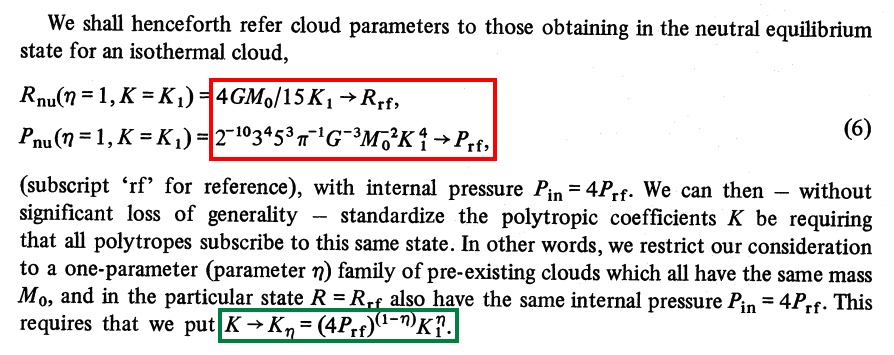Difference between revisions of "User:Tohline/SSC/Structure/BonnorEbert"
(→Virial Equilibrium: Summarize results from virial analysis of an embedded sphere) |
(→Summary of Analytic Results: Insert analytic coefficients for virial n = 6/5; and delete second table) |
||
| Line 24: | Line 24: | ||
<div align="center"> | <div align="center"> | ||
<table border="1" width="90%"> | <table border="1" width="90%" cellpadding="4"> | ||
<tr> | <tr> | ||
<td colspan="8" align="center">'''Example:''' Specify <math>c_s</math> and <math>P_e</math></td> | <td colspan="8" align="center">'''Example:''' Specify <math>c_s</math> and <math>P_e</math></td> | ||
| Line 72: | Line 72: | ||
</td> | </td> | ||
<td align="center"> | <td align="center"> | ||
<math>\biggr(\frac{3^4 \cdot 5^3}{2^{10} \pi}\biggr)^{1/2} </math> | <math>\biggr(\frac{3^4 \cdot 5^3}{2^{10} \pi}\biggr)^{1/2} </math><br> <br><math> \approx 1.77408</math> | ||
</td> | </td> | ||
<td align="center"> | <td align="center"> | ||
| Line 81: | Line 81: | ||
</td> | </td> | ||
<td align="center"> | <td align="center"> | ||
<math>\biggl(\frac{3^2 \cdot 5}{2^6\pi} \bigg)^{1/2}</math> | <math>\biggl(\frac{3^2 \cdot 5}{2^6\pi} \bigg)^{1/2}</math><br> <br><math> \approx 0.47309</math> | ||
</td> | </td> | ||
<td align="center"> | <td align="center"> | ||
| Line 99: | Line 99: | ||
</td> | </td> | ||
<td align="center"> | <td align="center"> | ||
<math>\biggl( \frac{3^{19}}{2^{12}\cdot 5^9 \pi} \biggr)^{1/2} </math><br> <br><math> \approx 0.21505</math> | |||
</td> | </td> | ||
<td align="center"> | <td align="center"> | ||
<math>\biggl( \frac{1}{2} \biggr)^{3/10} \biggl( \frac{3^7}{2^8 \pi} \biggr)^{1/2}</math> | <math>\biggl( \frac{1}{2} \biggr)^{3/10} \biggl( \frac{3^7}{2^8 \pi} \biggr)^{1/2} </math><br> <br><math> \approx 1.33943</math> | ||
</td> | </td> | ||
<td align="center"> | <td align="center"> | ||
| Line 108: | Line 108: | ||
</td> | </td> | ||
<td align="center"> | <td align="center"> | ||
<math>\frac{3^{9}}{2^{7}\cdot 5^{6} \pi} </math><br> <br><math> \approx 0.0031326</math> | |||
</td> | </td> | ||
<td align="center"> | <td align="center"> | ||
| Line 115: | Line 115: | ||
<td align="center"> | <td align="center"> | ||
<math>\biggl( \frac{\bar{c_s}^4}{GP_e} \biggr)^{1/2}</math> | <math>\biggl( \frac{\bar{c_s}^4}{GP_e} \biggr)^{1/2}</math> | ||
</td> | </td> | ||
</tr> | </tr> | ||
Revision as of 19:21, 27 October 2012

|
|---|
| | Tiled Menu | Tables of Content | Banner Video | Tohline Home Page | |
Mass Upper Limits
Virial Equilibrium
By examining the virial equilibrium of nonrotating, spherically symmetric configurations that are embedded in an external medium of pressure <math>P_e</math>, one can begin to appreciate that there is a mass above which no equilibrium exists if the effective adiabatic exponent of the gas is <math>\gamma_g < 4/3</math>. Assuming uniform density and uniform specific entropy configurations for simplicity, there is an analytic expression for this limiting mass and for the equilibrium radius of that limiting configuration. Specifically,
<math> M_\mathrm{max}^2 = \frac{3\cdot 5}{2^2 \pi} \biggl(\frac{4}{3\gamma_g} - 1 \biggr) \biggl[ \frac{3 \gamma_g}{4} \biggr] ^{4/(4-3\gamma_g)} \biggl[ \frac{\bar{c_s}^8}{G^3 P_e} \biggr] \, , </math>
and,
<math> R_\mathrm{eq}^2 = \frac{1}{5^2} \biggl[ \frac{4}{3\gamma_g} \biggr]^{2/(4-3\gamma_g)} \biggl[ \frac{GM_\mathrm{max}}{\bar{c_s}^2 } \biggr]^2 = \frac{3}{2^2 \cdot 5\pi} \biggl[ \frac{3\gamma_g}{4} \biggr]^{2/(4-3\gamma_g)} \biggl( \frac{4}{3\gamma_g} - 1 \biggr) \biggl[ \frac{\bar{c_s}^4 }{GP_e} \biggr] \, . </math>
Polytropes Embedded in an External Medium
Polytropes embedded in an external medium
Summary of Analytic Results
| Example: Specify <math>c_s</math> and <math>P_e</math> | |||||||
|
<math>~n</math> |
<math>\eta = 1+1/n</math> |
<math>M_\mathrm{max}</math> |
<math>R_\mathrm{eq}</math> |
||||
|
<math>\alpha_\mathrm{virial}</math> |
<math>\alpha_\mathrm{DHB}</math> |
<math>\mathrm{scale}</math> |
<math>\alpha_\mathrm{virial}</math> |
<math>\alpha_\mathrm{DHB}</math> |
<math>\mathrm{scale}</math> |
||
|
<math>\infty</math> |
1 |
<math>\biggr(\frac{3^4 \cdot 5^3}{2^{10} \pi}\biggr)^{1/2} </math> |
-- |
<math>\biggl[ \frac{c_s^8}{G^3 P_e}\biggr]^{1/2}</math> |
<math>\biggl(\frac{3^2 \cdot 5}{2^6\pi} \bigg)^{1/2}</math> |
-- |
<math>\biggl( \frac{c_s^4}{GP_e} \biggr)^{1/2}</math> |
|
5 |
6/5 |
<math>\biggl( \frac{3^{19}}{2^{12}\cdot 5^9 \pi} \biggr)^{1/2} </math> |
<math>\biggl( \frac{1}{2} \biggr)^{3/10} \biggl( \frac{3^7}{2^8 \pi} \biggr)^{1/2} </math> |
<math>\biggl[ \frac{\bar{c_s}^8}{G^3 P_e}\biggr]^{1/2}</math> |
<math>\frac{3^{9}}{2^{7}\cdot 5^{6} \pi} </math> |
-- |
<math>\biggl( \frac{\bar{c_s}^4}{GP_e} \biggr)^{1/2}</math> |
Bonnor-Ebert Limiting Mass
Here we will refer to the original works of Ebert (1955, ZA, 37, 217) and Bonnor (1956, MNRAS, 116, 351) .
In his study of the "global gravitational stability [of] one-dimensional polytropes," Whitworth (1981, MNRAS, 195, 967) normalizes (or "references") various derived mathematical expressions for configuration radii, <math>R</math>, and for the pressure exerted by an external bounding medium, <math>P_\mathrm{ex}</math>, to quantities he refers to as, respectively, <math>R_\mathrm{rf}</math> and <math>P_\mathrm{rf}</math>. The paragraph from his paper in which these two reference quantities are defined is shown here:
In order to map Whitworth's terminology to ours, we note, first, that he uses <math>M_0</math> to represent the spherical configuration's total mass, which we refer to simply as <math>M</math>; and his parameter <math>\eta</math> is related to our <math>~n</math> via the relation,
<math>\eta = 1 + \frac{1}{n} \, .</math>
Hence, Whitworth writes the polytropic equation of state as,
<math>P = K_\eta \rho^\eta \, ,</math>
whereas, using our standard notation, this same key relation is written as,
<math>~P = K_\mathrm{n} \rho^{1+1/n}</math> ;
and his parameter <math>K_\eta</math> is identical to our <math>~K_\mathrm{n}</math>.
According to the second (bottom) expression identified by the red outlined box drawn above,
<math> P_\mathrm{rf} = \frac{3^4 5^3}{2^{10} \pi} \biggl( \frac{K_1^4}{G^3 M^2} \biggr) \, , </math>
and inverting the expression inside the green outlined box gives,
<math> K_1 = \biggl[ K_n (4 P_\mathrm{rf})^{\eta - 1} \biggr]^{1/\eta} \, . </math>
Hence,
<math> P_\mathrm{rf} = \frac{3^4 5^3}{2^{10} \pi} \biggl( \frac{1}{G^3 M^2} \biggr)\biggl[ K_n (4 P_\mathrm{rf})^{\eta - 1} \biggr]^{4/\eta} \, , </math>
or, gathering all factors of <math>P_\mathrm{rf}</math> to the left-hand side,
<math> P_\mathrm{rf}^{(4-3\eta)} = 2^{-2(4+\eta)} \biggl( \frac{3^4 5^3}{\pi} \biggr)^\eta \biggl[ \frac{K_n^4}{G^{3\eta} M^{2\eta}} \biggr] \, . </math>
Analogously, according to the first (top) expression identified inside the red outlined box,
<math> R_\mathrm{rf} = \frac{2^2 GM}{3\cdot 5 K_1} = 2^{2/\eta} \biggl( \frac{GM}{3\cdot 5}\biggr) K_n^{-1/\eta} P_\mathrm{rf}^{(1-\eta)/\eta} ~~~~\Rightarrow~~~~ R_\mathrm{rf}^\eta = \frac{2^{2}}{K_n} \biggl( \frac{GM}{3\cdot 5}\biggr)^\eta P_\mathrm{rf}^{(1-\eta)} \, . </math>
Related Wikipedia Discussions

|
|---|
|
© 2014 - 2021 by Joel E. Tohline |
